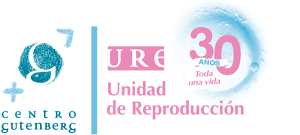Basic fertility study: what tests are needed?
Many couples ask us when they should start looking into assisted reproduction if they want to have kids. And our response is always the same: if you haven’t conceived naturally after a year of regular, unprotected intercourse, we recommend that you visit a specialist in gynaecology. He or she will perform the necessary testing in order to determine the cause of the problem, and this is what we call the basic fertility study.
It is important to keep in mind that this process does not begin with tests or analyses. First things first, the most important thing is to try to determine the cause of infertility by reviewing detailed medical records.
For this first step your gynaecologist will ask you the relevant questions. He or she will attempt to find out whether your cycles are regular or not, whether you’ve undergone any surgeries and if you have symptoms indicating a condition such as endometriosis, etc. He or she will also ask your partner questions, especially regarding any infections he may have had or what his line of work is, in case his answers indicate that he is at risk for sperm abnormalities.
There is something fundamental you must keep in mind regarding the basic fertility study: it’s that the more information we have about a couple, the more effectively we can make an initial diagnosis.
What tests are needed in order to undergo assisted reproduction treatment?
With all of the above, once we’ve gathered all the necessary information we will proceed to request the additional tests that are needed to reach a diagnosis. Initially speaking we’ll need three basic tests.
Two of these tests will be for the female. The first is a hormone analysis which is performed between days three and five of the woman’s period to confirm whether the ovaries are functioning properly. The second test is a transvaginal ultrasound which is essential to detecting anatomic abnormalities and also assessing ovarian reserve. In other words, the number of eggs each woman has.
The third test we request is for the male and is a basic sperm analysis. Through this analysis we evaluate the number, motility and morphology of spermatozoids in addition to analysing capacitation or REM, which helps us determine how many spermatozoids are really capable of fertilisation. If the results come back abnormal then a second test would be clinically indicated, as sperm parameters can vary greatly from one analysis to another. The sperm analysis makes it possible for us to decide whether we should perform further testing on the male partner or not, and it guides us in terms of determining the ideal fertility treatment.
Other diagnostic testing in the basic fertility study
Alternatively, and depending on the results of the sperm study or a suspicion the doctor may have based on clinical indicators, we could perform an X‑ray on the fallopian tubes, or a hysterosalpingogram. The purpose of this imaging test would be to assess whether the fallopian tubes are functioning properly, the organ where the joining of the egg and spermatozoid takes place.
At our fertility clinic in Spain, once we have all of these results we are able to diagnose the majority of reproductive issues. And, as a result, we can offer you different options in terms of fertility treatment.
One thing to keep in mind is that, on occasion, results will come back completely normal. This is because it’s not always possible to pinpoint the exact cause of fertility issues through testing. However, this doesn’t mean we can’t carry out treatment that will be successful and result in a pregnancy and a healthy baby at home.


